
![]()
~ LOCAL GOVERNMENT ~
CANTERBURY
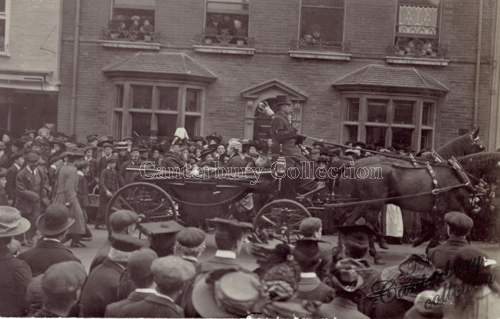
The Mayor Francis Bennet-Goldney, Lower Bridge Street
1498. King Henry VII. by charter, called Novae Ordinationes, extends the number of Aldermen from 6 to 12, and reduces that of the Common-council from 36 to 24; also ordains that, for the future, the Mayor shall be elected by in-dwelling freemen only. The Sheriff of Canterbury holds a court, once in every lunar month, through his year of Sheriffalty. HT
1553 - William Copyn, Mayor, Thomas Walker Sheriff, George Toftes, Coroner. CC/JQ/351/i
1592. John Bois, esq. (afterwards Sir John Bois, knt. and founder of Jesus Hospital, in Northgate) is admitted to the freedom of the city; and is to continue Legis-Peritus, and bear the name and office of the Recorder of the city. He is the first Legis-Peritus, called by the title of Recorder, and is appointed Recorder by the charter of king James. HT
1638. The salary of the mayor is set at 100l. The mayor and commonalty grant to Arnold Spencer all the powers, privileges and authorities, vested in them by act 6 Henry VIII. for deepening and cleaning the river. A wharf is directed to be made by the side of the river. HT
1640. Mr. William Somner presents to the mayor and commonalty his book intitled, "The Antiquities of Canterbury." In the year preceding, the corporation had voted this gentleman the freedom of the city, as a mark of thier respect. HT
(WILL) John WATSON esq. maior of the city of Canterbury - (Dat. 29 June 1645) - Bur. in chancel of ch. of St. Margarett in sd city as near unto my father there interred as may be - Legacies to poor of parishes of St. Andrew and St. Margaret - Wife Dorothy and her late decd uncle Mr. Wm. Saker of Blacke Fryars, Lond - Eldest son Wm. (under 21) - Mess. in which I now dwell in St. Andrew parish held of Dean and Chapter of Christ Church Canterbury - Younger son John - Rest of my surviving children - House at the Bulstake in the said city wherein Robert Dent now dwelleth - Meadow in parish of St. Peter & Holy Cross at Westgate in said city called Usyers. Dau. Mildred - Land in Isle of Thanet in occupation of William Watson. - Child my said wife now goeth with - Sister. Margaret Wood widow and her daughter Elizabeth wife of Thomas Ewell. - Fras. son of Mr. William Somner of this said city. - Friends Edmond Randolph of said city dr of phisick & Henry Jenkin of said city gent overseers - Wife Doroty extrix - Mess. & lands in Reculver & Hearne, co. Kent at Broomefield greene in occupation of William Sturges. - The Castle of Canterbury held in fee farm of the King's Majesty as of his manor of East Greenwich. - Lands in Newe Romney, Medley & Hope Alsaints late in occupation of Thomas Hillyard - Farms in Chistlett in occupation of widow Mason & Ambrose Cocke - Land called Masden in occupation of (blank) Read - Herdemans Farm in Aldington late bought of (blank) Maxted & (blank) Hawkins now in occupation of (blank) Kingsford - Mess. in Dover in St. James Street now in occupation of Richard Stokes Maltster - Mess. in North Lane without the walls of Canterbury & Wincheapgate in parishes of St. Mildred and St. Mary Castle, Canterbury - Children of said sister Margaret Wood - Wit: Tho. Golde, John Milles, Wm. Somner. (Codicil dat. 12 July 1645) - Friend Avery Sabyn esq one of the alderman of the said city to be exor in case said wife does not give sufficient security. - Mr. William Somner the writer of said will. Mr. Edward Aldrey rector of St. Andrew in said city. John Watson. Witn: Edw. Aldrey, Wm. Somner. (Pr. 1 Apr. 1658 by Wm. Watson son & substitute exor, the exorship of said will heretofore granted to Dorothy the relict & limited extrix during minority of said William being first declared to be expired. P.A. p. 149)
1659 James MASTER, alderman, in goal for debt CCA
1685. Sir William Honywood, bart. M.P. is elected mayor, and, waving his privilege, takes the oaths and the office.
1687. Henry Lee, esq. now mayor, by order of the king in council, and a special commission, is removed from the office of mayor, and J. Kingsford, sen. esq. is elected mayor in his room. Many of the aldermen and common council are also displaced, and others chosen in their stead.
1693. John Kingsford, esq. mayor, by virtue of the king's letter, on the 14th of Sept. is continued mayor for the year ensuing, with the consent of the freemen, who, out of loyalty to the king, unanimously elect and continue Mr. Kingsford in that office.
By virtue of the king's proclamation, for restoring to corporations their ancient rights, the charter of king James is restored to the city, and Mr. Kingsford being removed from his office, Henry Gibbs, esq. is chosen and sworn mayor in his room, for the remainder of the year. All the aldermen and common council, who were displaced in 1687, are, in like manner, restored to their offices. HT
W. Gray's election as Mayor 14 Sept., 1760, with numbers of votes. W. Gray tallow-chandler was born in Mercery Lane, 1 Feb. 1695/6; sworn Freeman April, 1717. [sic] in Mayoralty of Valentine Jeken Esq. W. Gray set up in trade 10 June, 1718, in Burgate in St. M. Magdalen parish; bought the said house 22 June, 1751. Chosen Common Councilman December. 1724. Never served as Sheriff, though 24 years a Commoner. Voted Alderman, apparently against his will, Lammas Day, 1748; chose to serve since fine was £30 for refusal. Sworn Alderman of Worthgate 16 Aug. 1748. Failed to be elected Mayor 14 Sept., 1748, though now evidently anxious for office. CCA-CjC-SuppMs/6
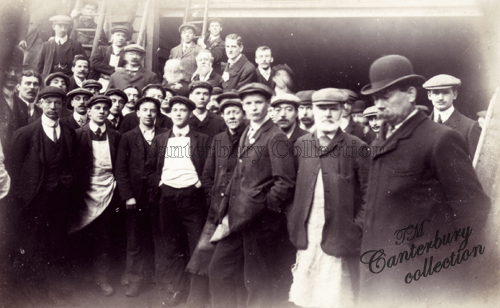
Workers Union and H. WOODCOCK c. 1910
Noted on back of the card...."Canterbury Mr. Woodcock with Rosette"
I recall seeing on another old postcard with a placard saying "WOODCOCK for THE WORKERS"
General Election January 1910
Hubert Bayley Drysdale Woodcock 1867-1957, unsuccesful Liberal candidate for Canterbury, January 1910
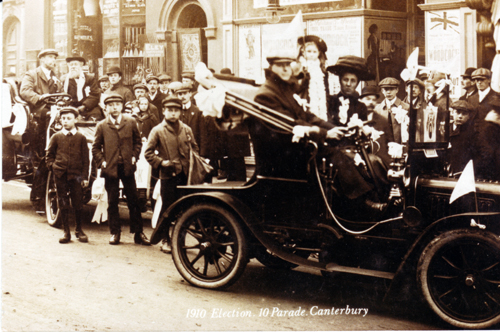
1910 Election Hubert Bayley Drysdale Woodcock outside his headquarters in the Parade (Saunders Card)
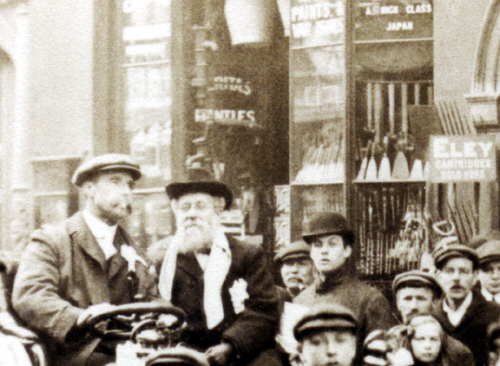 _
_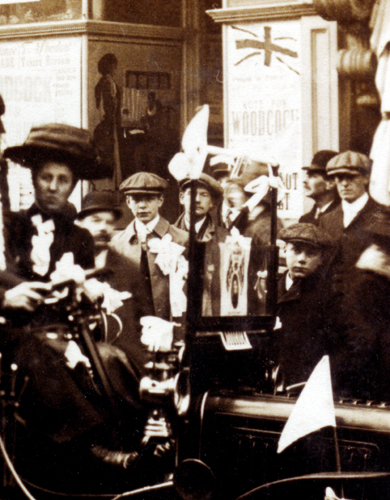
Holy Cross at Westgate, so called, because it stood over that Gate, and had a Crucifix set up over the Porch, or Entrance of it. This Church was made into a Vicarage by the same Archbishop Stratford. In this Church are divers Monuments for William Charnel, styled first Chantry-Priest of Jesus, for the Fraternity of Jesus-Mass (as it was called) was kept of old in this Church. Stephen Matthews, (Pannarius) a Draper, Robert Col, (Pandoxster) a Brewer, John and Robert Nayler, Alderman, and Thomas Lynd the first Mayor of this City, with three Vicars in the Chancel, and Clement Harding, Batchelor at Law.
Magna Britannia Antqua & Nova 1738
"September - Promoted, Mr. HARNETT, to be an Alderman of the city of Canterbury." The Universal Magazine 1751
"Rev. Dr. LEE, to be Judge of the Prerogative Court of Canterbury and Dean of the arches." The Universal Magazine 1751
1755-56
William PEMBROOKE Esq, Mayor
John KNOWLER Esq. Recorder a person learned in the law
Thomas DAVIS, Alderman
John WATTS, Alderman
Mark THOMAS, Alderman
prisoners - William HUDSON, William BETHEL, and Richard RAPIER, convicted of robbery of John SAFFERY in the Kings Highway in the parish of St. Mary Northgate, and Edward TAYLER. "they are sentenced to go from hence to the place from whence they came and from thence to the place of execution and thereto be severally hanged by the neck till they are dead."
Will GROVES of Dover...William GROVES to appear next session concerning that he is the father of a bastard child likely to be born to Elizabeth GUY of St. Paul in the city of Canterbury.
"August 25, 1795, Death, at Canterbury, Richard BARHAM, esq. one of the Aldermen of that corporation." The Gentlemen's Magazine 1795
"October 11, 1795, Death at Canterbury at his house in St. George's, Canterbury, William LONG, esq. an eminent attorney at law, and senior alderman of that corporation." The Gentlemen's Magazine 1795
May 21, 1797, Death at Canterbury, aged 50, Mr. Thomas CLOWES, surgeon, mayor of that city. He was a native of Market Harborough, in Leicestershire, and for some time followed the profession of a surgeon and apothecary at that place; but afterwards removed successively to Henley, in Oxfordshire, to Wingham in Kent, and finally to Canterbury. GM
Alderman James Simmons carried out extensive re-paving of city streets (died 1807), master of Dane John Fields (later known as "Dane John Garden") CCA-CC-A/C/11
"W. Fuller Boteler, Esq. Recorder of Canterbury." 1811
"Matthew Sankey, Esq., Alderman of Canterbury." 1811
Charles POUT, sworn mayor 7 Oct 1817 cca
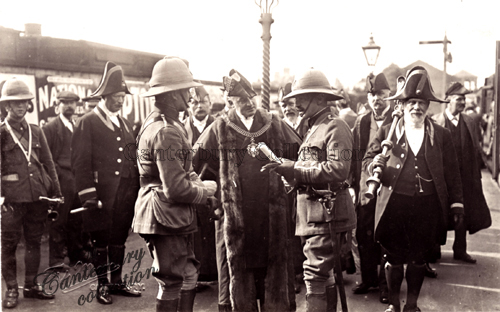
Canterbury West Station - Sept 17th, 1908
General Fanshawe (2nd Calvalry Brigade), Mayor Bennet-Goldney, Col. Dietz, Sheriff Whittaker and Alderman Mason
The departure of the 7th Dragoon Guards
"Death, Nov 26 at Canterbury, aged 69, Richard HALFORD, sen. esq. Alderman, and 30 years Chamberlain of that city." The Gentlemen's Magazine 1824
"The following are on flat stones, in the South Aisle, almost effaced, but are preserved by Stow:
Peter Theobalds, of this parish, who had a wife Mary, daughter of John TERRY, Alderman of the City of Canterbury, 1650."
The history and antiquities of the parish of Bermondsey by George W. Phillips, 1841
C. R. Bunce, Mayor of Canterbury *subscribed 1790 to "A Full Inquiry into the Subject of Suicide: To which are added (as being closely connected with the subject) two treatises on duelling and gaming by Charles Moore
"August 15th, Death at Canterbury, Richard
Barham, esq. one of the aldermen of that corporation."
The Gentlemen's Magazine 1795
"October 11th, Death at his house in
St. George's, Canterbury, William Long, esq., an eminent attorney at
law, and senior alderman of that corporation."
The Gentlemen's Magazine 1795
At the late election for Canterbury, a question was agitated whether freemen who had received any relief within a year, were thereby disqualified to vote. Mr. Serjeant Marshall clearly showed, that poverty was no disqualification at common law, and cound not be peaded unless warranted by the immemorial usage of the place; and that, consequently, as no such usage had ever prevailed at Canterbury, a pauper had the same right to vote as any other freeman. It was determined accordingly, that all voters of this description should remain on the poll.
The Monthly Magazine 1796 pg. 436
Died at Canterbury (June), In his 68th year, Mr. T. Sankey, grocer and tallow chandler, and one of the common-council-men of this city. - The Monthly Magazine 1801 pg. 469
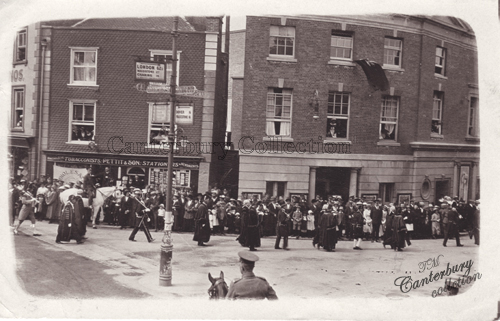
An Event 1916 in Lower Bridge Street
And one John Swan, a parishioner and an alderman, and sometime mayor, gave in like manor 66s. 8d. towards the work of a new roof and steeple here, when it should happen to be made. The History and Topographical Survey of the County of Kent, Edward Hasted 1801 (St. Andrew)
Died at Canterbury (November) Mr. J. Simmons, corn-factor - The Monthly Magazine 1803 pg. 393
Died December, at Canterbury, After a painfull illness, Henry Tritton, esq., Alderman and Late Mayor of Canterbury. The Gentlemen's Magazine 1806 vol 76 pt2
Some account of the late James Simmons, esq. one of the M.P.'s for Canterbury in the present parliament. Mankind are but too fond of contemplating heroes and launching their admiration on exploits, which they can never hope, either to imitate, or excel. On the other hand, the biography of the middle ranks of life, abounds with practical instruction. Mr. Simmons was born in that city, which he was afterwards destined to represent, about the year 1740, in a little obscure house, in the immediate vicinity of the cathedral; his parents* were poor but honest, and he was educated at the king's school, in Canterbury, originally founded by Henry VIII. Having been sent to London, while a boy, he became an apprentice to the late Mr. Thomas Greenhill, an eminent tradesman, nearly opposite to the Mansion-house; whose house has since been converted into a banker's shop; thus still keeping up, although not its ancient firm, at least its ancient employment, stationers and bankers being both dealers in paper. Mr. Simmons at length, entered into business for himself, and, having become a liveryman, was afterwards put in nomination for sheriff. This occurred twice, first in 1802, and then we believe in 1806, when it was represented that this state of health would prevent him from undergoing the fatigues of office. Notwithstanding the advantages held out by a residence in the capital, yet the subject of this brief memoir still languished to return to his native city; he accordingly repaired thither, about the year 1768, and immediately established a printing office, with the management of which, he had before made himself acquainted. The reader, perhaps, will smile to learn, that he was, at this period, the only printer in Kent! The first effort made by him towards prosperity, was the publication of a newspaper, called "The Kentish Gazette:" before that period, the Kentish Post, or Canterbury News, was the only paper belonging to that extensive and opulent county**. It consisted of our foolscap folio pages, contained but two or three advertisements, and was adorned with a wood cut that occupied full one third of the first leaf. Having introduced a new type, and a new taste, this undertaking succeeded to admiration, and Mrs. S. soon became the first stationer, bookseller, &c. in the city that gave him birth. He was also chosen a member of the corporation, and became a commoner, alderman, and mayor, in rotation. But the rise of the subject of this memoir is chiefly to be attributed to his politics, to his whiggism! Having taken part, with Mr. Honeywood, in the contests for the county, &c. he was of course patronized by that party; and , when at the conclusion of the American war, the Marquis of Rockingham, Mr. Fox, &c. came into power, in 1783, he was appointed, during their short administration, Distributor of Stamps for the county of Kent, the emolument of which office, have always been estimated at a very considerable sum. From this moment, however, the services of Mr. S. (at least in a political point of view) were lost to his country, as he was precluded by his situation, from opposing the first French War, and all the alterations introduced in consequence of it, (by Mr. Pitt), into the constitution, with the same ardour, that he had combated the American contest, and the malversations of Lord North. This , however, did not prevent him from distinguishing himself, by what may be termed the Civic Virtues. The first public act of this kind, in which his zeal became manifested, was the offer of his services to regulate the new improvements introduced into Canterbury, in consequence of an act of parliament. It was he, in particular, who superintended the paving of that city; and such was the attention and ability displayed by him on this occasion, that he received the thanks of the corporation, which were accompanied by a piece of plate of the value of 50l. The next public work engaged in , by him, was the erection of a mill on a magnificent scale, for the regular supply of the Canterbury market with flour. In 1791, Messrs.. Simmons and Royle gave a premium of 2450l for a thirty years' lease of Abbot's and King's mill, and they expended on the building and other improvements to the amount of 8000l. more. Mr. Smeaton, the late celebrated engineer, while engaged at Ramsgate harbour, undertook the erection of a new mill, with such a power as to be able to turn six, and even eight pair of stones. When spoken to by Mr. Simmons, and asked if he would undertake it, he replied in the affirmative, adding at the same time with a smile, "Yes, I consent to your request, and I am the only man in England, who can complete your project; for I have been occupied all my life about water, and think I can make a drop of it go further than any other man in the kingdom." Instead of converting this project, which was finished by Mr. Abbot, of Canterbury, in a very masterly manner, into a monopoly for the oppression of the inhabitants, and the creation of an immense fortune, Mr. Simmons was enabled to realize those projects dearest to his heart. It was capacious enough for the ambition of any man, or the execution of an scheme,*** as it forms a quadrangle of 72 feet, by 52, 5 inches; the height from the foundation to the vane is about 100 feet, and it contains six working floors, besides the observatory on the top, in which Mr. S. was accustomed, at times, to give entertainment's to public bodies, such as the chief officers of the district &c. As the returns have been computed at 40,000l per annum, he was enabled to keep down the price of meal, and the assize of bread. To achieve this, he cheerfully assisted the magistrates in adjusting the value of the quarter loaf, and in 1800, published an advertisement, by which he invited the industrious poor to come in person for a supply of their necessities* In 1804, Mr. Alderman Simmons acted as President of the Guardians of the Poor. On this occasion he introduced a weaving manufactory, and employed the children of distressed persons, within the liberties of the city, to the number of 150, who received the whole of their wages without deductions; some of the girls of only twelve years old, earned three shillings and sixpence a week by spinning alone. During his administration, the arrears were collected, the accounts settled, and a large debt liquidated. The next undertaking we shall mention, is the project of a canal from Canterbury to the sea, by means of which, and proper piers, wharfs, &c. that ancient city would have been enabled to enjoy all the advantages of a port. To accomplish this, Mr. Whitworth, a celebrated engineer repaired thither, at the request and at the sole expense of Mr. Simmons; (more to come)
The Monthly Magazine 1807 pg. 187
*the writer of this article has always understood that his father was a barber, and he the more readily mentions this circumstances in order to prevent the minds of industrious young men in that rank of life, from relaxing in their exertions, or despairing of their future elevation. The constitution of this country, happily enables every man to aspire to the first honours of the state, and it is only the low-born prejudices of rank and wealth, that can ridicule any state that does not depend on the volition of an individual
**As the Kentish Post of December 19, 1724, now lies before me, I shall subjoin a theatrical advertisement, by way of specimen:-"This is to acquaint the Curious, That at the Theatre in High Street, Canterbury, is to be seen the most Noblest Piece of Work that ever was performed upon a British Stage; consisting of a large Artificial Actors, five Feet high; and by them will be Acted, on Saturday next, a Play, call'd The Unahppy Favourite, or the Earl of Essex, with the Beheading of the Earl upon a Mourning Scaffold, and his Head expos'd to publick View by the Hands of the Executioner. Having met with great Applause from both the Universities, and most of the Nobility and Gentry resorting to Bath and Tunbridge Wells, and most of the Judicious Places of the Kingdom. - Note, There is a new pair of Stairs, and the Theatre is Ceil'd, being now made very commodious for Gentlemen, Ladies, &c."
***The following is an account of this ingenious contrivance: - "To the grinding floor the walls are substantially built of brick and stone; from thence to the eaves, the building is continued with rueffy timer, covered with plain weather-boarding, terminating on the four sides, handsomely and uniformly sashed, with a bold block cornice, and the whole roof covered with slates. The wheel thoroughs are accurately curved, and lined with jointed Portland stone. The four water wheels, which put the whole machinery in motion, are sixteen feet diameter, and seven feet wide. the four wheels, whose nuts, arms, and shafts, are iron, carry eight pair of stones. From the four wheels, by a continuation of upright iron shafts, motion is given to the complicated machinery for clearing the corn, dressing the flour and lastly to the lifting tackle upon the upper floor. The mill-works, which are distinct for each water wheel, are of iron, where it would be properly substituted for wood, and the whole finished with a mechanical accuracy, so much to the credit of the several artists employed in their construction, that though the greatest fall of water here never exceeds five feet three inches, this mill is so powerful, as to be capable of grinding and dressing into flour 500 quarters of corn weekly.
"There the vast mill-stone with inebriate whirl, On trembling floors his forceful fingers twirl; Whose flinty teeth the golden harvests grind, Feast without blood! and nourish human kind."
The bridge over the mill stream, the adjoining swinery, spacious lodges and stabling, and a spacious shop for retailing meal and flour in small quantities, besides a number of dwellings in Brown's land, and King's street, are additional and recent improvements by Mr. Alderman Simmons, now the sole lessee of Abbot's Mill." Gostling's Walk
To the industrious poor of the City and suburbs of Canterbury - I last week informed you, that on account of the very high price of bread and meat, I had directed, that meal should be sold to you at Abbot's mill, at the reduced price of one shilling and sixpence per gallon. I was extremely concerned, that you lost so much time at the mill on Saturday last, before you could be served; but the plan I have now adopted, will, I trust, prevent any such delay in future. I wish to make this relief to you as acceptable, as I trust it is reasonable, and with little inconveniece to you as possible. I am sure you will excuse your being so long detained last week, when I tell you, that eight hundred and twelver poor families were served with two thousand four hundred and fifty three gallons of meal; and if the benefit which yourselves and your children received, was equal to your expectations, I am amply rewarded by your grateful acceptance of it. The second distribution of meal, at one shilling and sixpence per gallon, at Abbot's mill, will be as under: On Saturday morning, May 24, 1800; - The poor families from the parishes of Northgate and St. Alphage, from 6 till 9; from the parishes of St. Paul and St. Martin, from 9 til 11; from the parishes of St. Andrew and St. Mary Bredman, from 11 till 12; from the precincts of Christ Church and Staplegate, from 12 till 1 - On Monday morning, May 26, 1800; The poor families from the parishes of St. Mildred and All Saints, from 6 till 8; from the parishes of St. George and Burgate, from 8 till 9; from the parishes of St. Mary Bredin, from 9 till 10; from the parishes of St. Peter and Westgate, from 10 till 12; from the parish of St. Dunstan, from 12 till 1.
Some unfavourable reports, I understand have been propogated respecting the quality of the meal; but you may believe me, good people, that sooner than have offered you so gross an affront, or so shamefully have insulted your feelings, as to sell you bad meal, or dirty mixtures, under the pretence of relieving your distress; I would have burnt the mill to the water's edge. From what quarter such reports have arisen, I do not pretend to say, but if the bakers of this city or suburbs, or any of them will have the goodness to walk down to the mill, during the distribution of the meal, it will be a very great satisfaction to me; knowing your distresses as they do, there can be no doubt, but that they will most readily give every assistance in their power to render this charity as effectual as they can towards your relief.
St. George's. May 22, 1800, James Simmons.
"Obituary - aged 47, Mr. William Bristow, Alderman of Canterbury, printer and bookseller, and treasurer of the Eastern parts of the county of Kent"
The Gentlemen's Magazine 1808
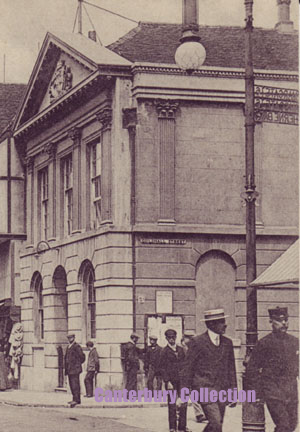
"Death, September 30th, suddenly, at his farm near Bishopsbourn, Thomas Parker, esq. mayor of Canterbury." The Gentlemen's Magazine 1810
"T.S. commmunicates the following anecdote relative to the late Lord Rokeby:
"When he represented the city of Canterbury, nearly fifty years ago, he laid a wager of 10l. with the late Alderman Simmons, of that city, that they both should live to see the day when the Bank of England would refuse to pay cash for their own notes. About thirty years after, the Bank suspended cash payments; and his Lordship, when upwards of eighty years of age, rode on his poney from Norton to Canterbury, publicly to demand his wager at the market table of the Alderman, which was instantly paid. At his death upwards of 40,000 guineas were found in his house."
The Gentlemen's Magazine 1819
"The city returns two members to parliament, a privilege which it has enjoyed since the reign of Edward I. The number of electors is about 1800."
The Edinburgh Gazetteer, Or Geographical Dictionary 1822
Died at St. George's Place, Canterbury, 69, Richard Halford, sen., esq., Alderman - The Monthly Magazine 1823 pg. 573
"Death, November 26, at Canterbury, aged 69, Richard Halford, senior, esq. Alderman, and 30 years Chamberlain of that city." The Gentlemen's Magazine January 1824
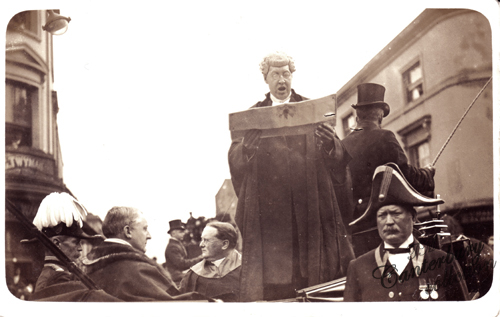
May 9th, 1910 Proclamation, showing Bennett-Goldney on the left
Henry Fielding the Town Clerk standing with the Proclamation
Henry VII., limited the number of aldermen to twelve, and the common council-men to twenty-four; and Henry VIII., by an act in the 35th of his reign, empowered the mayor and aldermen to levy a fine of six shillings and eightpence per day upon all strangers who should keep shops, or exercise any trade in the city. James I., in the sixth year of his reign, confirmed all the former charters and privileges, and re-incorporated the citizens, under the title of the mayor and commonalty of the city of Canterbury. The government, under these several charters, is vested in a mayor, recorder, twelve aldermen (including a chamberlain and sheriff), and twenty-four common council-men, assisted by a town-clerk, who is also coroner, a sword-bearer, mace-bearer, four serjeants at mace, and subordinate officers. The mayor is chosen on Holy-rood day* by the freemen, from among the twelve aldermen, who nominate two of their own body for election, and is sworn into office on the festival of St. Michael; the aldermen are selected from the common council-men by a majority of their own body, and the common council-men are chose from the resident freemen, in the same manner; the sheriff is chosen annually by a majority of the mayor and aldermen, from among the twelve aldermen; and the recorder, chamberlain, and town-clerk, are elected by a majority of the corporation. The mayor, recorder, and much of the aldermen as have passed the chair, are justices of the peace. The freedom of the city is inherited by birth, or acquired by servitude, gift, marriage with a freeman's daughter, and by purchase. The power of purchasing their freedom was allowed to English born Jews in 1829. The city is divided into six wards, named after the six ancient gates, over each of which two aldermen preside, who hold a court leet, with view of frankpledge, in October, when a constable, borseholder, and six commissioners of pavements are appointed for each ward. The corporation hold a court of burghmote on the first Tuesday in every month, at which the mayor or his deputy presides, assisted by the aldermen and common council-men, a majority of each of whom is necessary to constitute a court: this court, which is a court of record, and has been held from time immemorial, is convened by the blowing of a horn. They also hold courts of quarter session for the trial of capital offenders and misdemeanants, and a court of petty session on the first Thursday in every month, for determining minor offences. The mayor's court, which is also a court of record, is but rarely held; the last instance of its exercising jurisdiction in civil pleas was in February 1793. A court of requests is held every Thursday, under an act passed in the 25th of George II., for the recovery of debts under 40s., within the city liberties; but the precincts of the cathedral, the archbishop's palace, St. Augustine's abbey, and other privileged places, are exempted from its jurisdiction.
A Topographical Dictionary of England 1831 *or "the exaltation of the holy cross" September 14th (Constantine)
It is governed, under a charter granted to it by James I., by a mayor, recorder, twelve aldermen, including a chamberlain, twenty-four common councilmen, including a sheriff, a town clerk, a coroner, and various other inferior officers; and it is represented in parliament by two members, chosen by the freemen, about 1600 in number.
A Geographical Dictionary of England and Wales 1832
Land Tax Commissioners Names
"William Collard, Castle Street
Robert Sankey, Castle Street
Thomas Dorman, Castle Street
Russell Whitebread Launder, Saint Margarets
Major David Browning, Watling Street *he is noted in the Royal College of Surgeons 1844
John Furley, Saint Georges
Osborn Snoulton, Saint Georges
James White, Saint Georges
Thomas White, Saint Georges
John Pont, High Street
George Morris Taswell, Burgate Street
Edward Wootton, Burgate Street
William Dunbrain, Saint Margarets
William Philpott, Castle Street"
For the City and County of the City of Canturbury 1838 (Statutes at Large)
March 11th, 1833 - Coprorate Officers, Canterbury
Thomas De Lasaux, Gentleman
Richard Frend, Gentleman
Mathew William Sankey, Brewer; not acting, left Canterbury
John Cooper, Surveyor
James Sladden Browne, Coachmaker
Mawer Cowtan, Stationer
James Warren, Silversmith
Charles Pout, Auctioneer
John James Peirce, Solicitor; not acting
William Jones, Draper and Tailor (dead)
George Frend, Wine Merchant (dead)
William Homersham, Tanner
Henry Cooper, Tanner
Osborn Snoulten, Banker
John Brent, Miller
Sampson Kingsford, Miller
John Nutt, Town Clerk
Canterbury - John Brent, esq., Alderman. William Masters, Esq.
The Penny Cyclopaedia 1839
The mayor and sheriff are chosen annually. A third of the councillors are elected on the 1st of November each year, and half of the Aldermen are elected from the Councillors or qualified persons every three years on the 9th of November.
1843 "Council of the Borough"
William Plummer Esq., Mayor
Thos. Wilkinson, Gent., Sheriff
Aldermen: George Neame, Abraham Flint, William Masters, Henry Cooper, John Brent, Edward Plummer
Councillors
Dane John Ward: Frederick Freeman Cobb, Johnathan John Rutter, William Sladden, Robert Sankey, Charles Goodwin, George Austin
Westgate Ward: William Goulden, Robert Avann, James Read Reader, John Goulden, Edward Spear Southee, Robert Walker
Northgate Ward: William Howland, John Brent Jr., Samuel Beard, William Plummer, William Austen, Thomas Westwood
Land Tax Commissioners - 1844, For the City and County of the City of Canterbury
William Collard - Castle Street
Robert Sankey - Castle Street
James Delmar - Saint Margaret Street
*September 4, 1861. Marriage at St. Margaret's, Canterbury, Fred T. Curtis, esq., of Elmstone Court to Mary, eldest daughter of James Delmar, esq., Canterbury.
David Browning Major - Watling Street *he is noted in the Royal College of Surgeons 1844
Henry Kingsford - Saint George's Street
John Pout - High Street
William Dombrain - Saint Margaret Street
Thomas Philpott - Wincheap Street
Henry Christian - Saint George's Terrace
William Henry Trimnell - Parade
Thomas King - Saint George's Terrace
George Furley - Saint Margaret Street
George Furley Esq. Mayor of Canterbury - Subscriber to "Conseutudines Kanciae" by Charles Sandys 1851
James Green - Saint Margaret Street
Charles Mason - Parade
George Frederick Smith - Saint George's Street
William Clements - Parade
Charles Holttum - Saint Peter's Street
Thomas Goodban - Bridge Street
Edward Holttum - Saint George's Fields
Henry Clements - Saint George's Street
Edward Homersham - Hawkes Lane
George Homersham - High Street
Henry Ward - Mercery Lane
Samuel Powell - Saint Peter's Street
Thomas Hacker - Watling Street
George Ash - Watling Street
Joseph Taylor Tyson - High Street
1845 - Recorderships
We understand that the recordership of Canterbury, vacant by the death of Mr. Boteler, has been filled up by the appointment of John Deeds, Esq., of the Home Circuit, brother of one of the members for Kent. Mr. Deeds was called to the bar by the Inner Temple in Michaelmas Term, 1829.
Marriage, September 17th, 1846, at Canterbury, H. W. Miall, Esq., of Birkenhead, to Laura Brent, daughter of John Brent, Esq., magistrate and alderman of that city. - The Christian Reformer, or, Unitarian Magazine and Review 1846
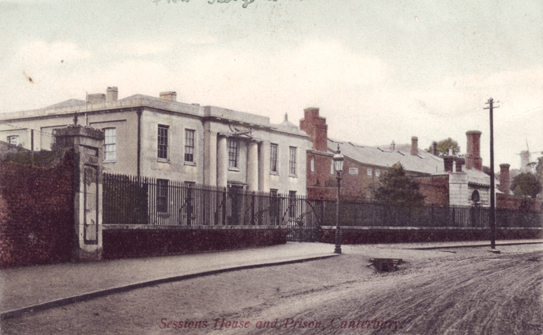
"Death of James Bradshaw, Esq. M.P. March 4th. In South street, Grosvenor square, after a lengthened illness of a most painful character, James Bradshaw, esq. M.P. for Canterbury. He was the son of James Bradshaw esq. of Portland place, by Harriet, daughter of Thomas Fitzhugh, esq. who afterwards married Sir Harry Peyton, Bart. He was first entered Parliament in 1823 as member for the now disfranchised borough of Brackley, which he represented until 1832. He sat for Berwick in the Parliament of 1835, and for Canterbury in that of 1837, the numbers at the close of the poll being, for
Mr. Bradshaw.....761
Lord A. D. Couyngham..........755
Mr. H. Plumptre Gipps.........751
Mr. F. Villiers..............698
In 1841 he was once more returned, after a sharp contest with Mr. Twisden Hodges, the numbers at the close of the poll being,
The Hon. Mr. Smythe...............813
Mr. Bradshaw................723**
Mr. Hodges...................716
Mr. Bradshaw was a determined Conservative, and voted against the Reform Bill, the Corn Law Repeal Bill, and any measure which partook of Liberalism. He was constant in attendance on his parliamentary duties while his health permitted, but seldom spoke in the House. His speech at an election meeting at Canterbury, in which he reflected, or by the writer of his speech was made to reflect, upon the Queen, was for a time the universal topic in political circles, and he apologised for it, on being questioned in his place in Parliament.
He married, several years since, the elder Miss Tree, the celebrated actress, sister to Mrs. Charles Kean and Mrs. Kemble Chapman, and that lady attended him up to his last moments. He leaves issue but one daughter, who is married to a Mr. Langley.
Mr. Bradshaw's will was made on the 27th January last, and leaves the whole of his property to his wife, who is sole executrix. The personalty is estimated at 30,000l."
The Gentlemen's Magazine 1847
**Mr. Bradshaw, late M.P. for Canterbury, has by will appointed his wife (formerly Miss M. A. Tree) sole executrix, leaving to her all his property of every description. The personalty was estimated at £30,000. Hereford Times (The Fine Art's Journal 1847)
The General Elections of 1847
Lord Albert Conyngham...808
Hon. G. P.S. Smythe.....782
Lord Clinton.....641
J. Vance......543
Annual Register 1852
1847 "Council of the Borough"
William Plummer Esq., Mayor
Robert George Chipperfield, Esq., Sheriff * Wm. James Cooper Esq. (as per The Jurist 1848)
John Nutt, Town Clerk (correct)
Robert Southee, 16 Ely-place, Holborn, Dep.
Thomas Lever Burch, Esq., Treasurer
Mr. W. M. Baskerville, Billet Master
Aldermen: George Neame*, Abraham Flint, William Masters, Henry Cooper*, John Brent, William Plummer
*subscriber to "A Topographical Dictionary of England" 1831
Councillors
Dane John Ward: Charles Goodwin, Charles Brock, James Delmar, Thomas Philpott, William Brock, Edward Wooton
Westgate Ward: Robert Walker, Edward Spear Southee, Henry Ward, Joseph Wilson, Thomas Rout Burch, William Mount
Northgate Ward: John Sneller, James Holland, George Wall, Frederic Beard, John Brent, Jun., Thomas Saker
1849 - from list of sheriffs, under-sherriffs, compiled by Leonard Laidman. William Sladden, esq., of 24, Castle-street, Canterbury
March Promotions - Canterbury, Frederick Romilly, esq., returned to Parliament. Annual Register 1850
1851 - George Neame, Magistrate Alderman, and Soap Manufacturer - living at Tower House in Holy Cross Westgate Within
July 24th, 1852, death at the Baths of Homburg, near Frankfort, aged 52, the Hon. Ricahrd Watson, M.P. for Peterborough, only surviving brother of Lord Sondes. Mr. Watson held a commission in the 10th Hussars, and served in the Peninsula. At the general election of 1830 he was returned to Parliament for Canterbury, and again in 1831 and 1832; but he refused to offer himself again in 1837, being disgusted with the conduct of the citizens in the affair of Sir William Courtenay. In private life he was very greatly respected; and his funeral at Rockingham was attended by a large concourse of the neighbouring gentry, tenantry and poor. Mr. Watson married, December 21, 1839, Lavinia Jane Quin, daughter of Lord George Quin, and niece to Earl Spencer, and has left issue. Annual Register 1852
The General Elections 1852
Hen. Plumptre Gipps...766
Hon. H. Butler Johnstone....757
Sir W. Somerville, bt.,......570
Colonel F. Romilly.....533
Annual Register 1852
Sir John Dodson, to be Judge of the Prerogative Court of Canterbury. Annual Register 1852
Parliamentary Papers 1853 - Existence of Corrupt Practices in the City of Canterbury
John TERRY senior called; did not answer
John TERRY junior sworn, and examined
Are you a freeman? - Yes
Did you vote last year? - Yes
Who did you vote for? Johnstone and Gipps
Did you have any money for your vote? No
Any colour tickets? Two
Employed as a messenger? No
Had you a vote in 1847? Yes
Who did you vote for? Conyngham and Smythe
Any money did you get? No
Colour Tickets? No
Were you employed as a messanger? No
You voted in 1847? Yes
Were you in the employment of Mr. Sharpe then? Yes
You voted blue because he voted blue? Yes
That is you voted blue because he voted blue? Yes
That is you voted blue because your masted voted blue? Yes
In 1852 you voted red, and your master voted red? Yes
And you voted red because your master voted red? Yes
*there is a J. Terry; is that John Terry or James Terry? I think that has no business to be in that list. It is money that I lent the man privately. I am not certain whether I gave Mr. Pout and account of that or not.
How much was it you lent him? I think about 5l or 6l. I lent it him at different times.
Did you lend it to him to secure his vote? No, I did not.
When did you lend it him? Previous to the election; a part he has borrowed since. It is more like a gift of charity than anything else.
How long before the election? It might be three or four months.
But how long before the election? Perhalps three or four months. I am telling as far as I know.
*1851 there was a William Sharp of 49 Burgate street who was an Upholster
TERRY, JOHN - Thinks this name has no business in the list, Kelson, 6228. Lent TERRY between 5l. and 6l. at different times before the election, and did not intend to charge Mr. Pout with it, itb. 6230, 6231.
"September 29th, death, at Canterbury, aged 72, Jane, younger daughter of the late J. Baker, esq. M.P. for Canterbury." The Gentlemen's Magazine 1854
List of Sheriffs and under-sheriffs, with their deputies and agents, for 1854
Canterbury - Joseph Jackson, Esq., Canterbury
Undersherrif - T. Thorpe De Lasaux, Esq., Canterbury
Dep., J. Fluker, 10 Symond's-inn, Chancery lane
The Jurist 1855
1853 - Sheriffs and under-sheriffs, with their deputies and agents, for 1853. Note - Warrents are not granted in town for those places marked (*)
*Canterbury - T. Thorpe De Lassaux, Esq., Canterbury.
Undersh. T. Thorpe De Lassaux, Esq., Canterbury.
Dep. James Fluker, 10, Symond's-inn
"Members returned to serve in this present parliament. August 21, 1854, City of Canterbury - Charles Manners Lushington, Esquire, and The Right Honourable Sir William Meredith Somervill, Bart., the last election for the said city having been declared void."
Bulletins and Other State Intelligence 1855
Died March 23, at Canterbury, aged 85, James Sladden Browne, esq. He had filled the office of chief magistrate, and was for many years alderman under the old corporation. GM1855
*Gas Works - Canterbury, for many years had been lighted with oil lamps, in so imperfect a manner, that an individual belonging to the Corporate Body, (Alderman James Sladden Browne) urged a plan for illuminating the city with gas; and after wading through great difficulty, at length succeeded in carrying it into effect. Mr. John Gosling became contractor, who afterwards vested the concern in a Company, and the shares now reap a handsome premium. Many of the lanes, which before the introduction of gas were literally in darkness, are now brilliantly illuminated, as well as the pricipal streets. WG1825
1856
Sheriff - J. Brevit, jun., Esq., Dane John, Canterbury
Undersheriff - Robert Walker, Esq., Canterbury
Deps. Madox & Wyatt, 30 Clement's-lane
"The Mayor (T. N. Wightwick, Esq.) said; "In the name of the Corporation of Canterbury, I beg to offer you our grateful thanks for the compliment which as been paid to us by the Kent Archaeological Society. My lord, gentlemen who have preceded me have been pleased to speak in eulogistic terms of the City of Canterbury, of the facilities it offers for archaeological research. It is, as we all know, a matter of congratulation to us to hear the locality which we inhabit spoken of in commendatory language. For, my lord, as there is a pride of ancestry, so there is a pride of place. And I am sure I shall be forgiven, as a citizen of Canterbury, for entertaining feelings of pride that we can offer in this our city attractions which can invite the attention and command the special attendance of such a scientific assembly as those now gathered around these boards. My lord, whilst we exult that Canterbury is rich in legendary lore whilst we glory that within a small circle of this very spot we can offer specimens of a bygone age, illustrative of almost all that your inquiring minds have, in the investigation of your science, as yet discovered, of themselves tending to bear testimony to the utility of your institution, we must not and we do not forget that we are, in a measure, indebted to your Society for revealing to us their existence, enabling us, as it were, on the very threshold of our houses to hold converse with the past, and affording to us a daily lesson for our guidance and our profit. It is not for me, my lord, at this late hour to occupy your time. I will content myself with assuring you how thoroughly you may rely on our hearty co-operation of our earnest desire to do all in our power to assist in your praiseworthy endeavours. And if, my lord, we can hereafter lay claim to the smallest portion of the benefit, which we feel convinced you will achieve, we shall be amply rewarded for our exertions."The Gentlemen's Magazine 1858
1858
T. N. Wightwick Esq*., Mayor
(*Steward of the Faversham Oyster Fishery in 1889)
1883 - The Law Times - Professional Partnerships Dissolved, Gazette, Jan. 4. Wightwick, Kingsford, Wightwick and Kingsford Solicitors, Canterbury: Thomas Norman Wightwick, Montague Kingsford, William Normam Wightwick and Cecil Edward Kingsford j. As regards T. N. Wightwick. Dec. 31. Debts by remaining partners.
*1889 - Thos. Norman Wightwick (firm of Kingsford, Wightwick & Kingsford) solictor and commissioner for oaths and for taking acknowledgency of married women, Watling street - William Norman Wightwick (firm of Kingsford, Wightwick & Kingsford) solicitor and commissioner and clerk to the Commissioners of Taxes for Home and Wingham division, Watling street, no. 16 (lives in Barton Fields). Also Cecil Edward Kingsford and Montague Kingsford
Dissolutions of professional partnerships from Dec 26, 1854 to January 19th 1855 - Kingsford, Henry, Henry Coare Kingsford, and Thomas Norman Wightwick, Canterbury, Attornerys, Solicitors, and Conveyancers, so far as regards the said Henry Kingsford. Jan. 2.
Partnership Dissolved. George Curteis, Henry Kingsford, and H. C. Kingsford, Canterbury, attornies at law, solicitors, and conveyancers. The Jurist July 20, 1844
The Solicitors' Journal & Reporter. July 6, 1861. - At a meeting of the town council of Canterbury, held on the 24th instant, Mr. Herbert Tritton Sankey, of this city, solicitor, was unanimously elected clerk of the peace for the city and borough, in the room of Mr. John Nutt, who had resigned.
"Mr. Syer Cuming exhibited three early seals in the possession of the Corporation of Canterbury, and gave a particular description of them. They were of the mayor or custos of the city, the seal for the recognizance of debtors, and one of the Baptism of the Saviour, probably belonging to the Hospital of St. John the Baptist, or Northgate Hospital."The Gentlemen's Magazine 1862
Members returned to serve in Parliament. March 7. City of Canterbury. Henry Alex. Butler-Johnstone, esq., in the room of the Hon. Henry Butler-Johnstone, who has accepted the office of Steward of H. M.'s Manor of Northstead. Gentlemen's Magazine 1862
1863 William Masters Esq., Alderman of Canterbury, High Street - Member of the Kent Archaeological Society
1863
Sheriff - Bartleet Allen Chambers, Esq., Canterbury
Undersheriff - Allen Fielding, Esq., Canterbury
Deps. Kingsford & Dorman, 23, Essex st, Strand, W.C.
The Solicitors' Journal & Reporter - November 2, 1872
The Recordership of Canterbury, Deal and Sandwich is vacant by the resignation of Mr. J. Deeds.
Mr. George Francis, barrister at law, of the Home Circuit, has been appointed by the Home Secretary to be Recorder of the city of Canterbury, in succession to Mr. John Deedes, who has resigned, having held the office since 1845. The new recorder is the son of George Francis, Esq., of Fairbrook, Kent, by Martha, his wife. He was born in 1824, educated at the Faversham Grammar School, called to the bar at Gray's Inn, in January, 1850, and is a member of the Home Circuit. He has been Recorder of Faversham, since March, 1864, and will probably continue to hold that office in conjunction with the Recordership of Canterbury. Mrs. Francis is married to Flora, daughter of Thomas McKitchie, Esq. late of Maidstone.
John Deedes Esq., Barrister-at-Law, Recorder of Canterbury Subscriber to "Consuetudines Kanciae" by Charles Sandys 1851
"The city is governed by six aldermen and eighteen councillors, from whom the Mayor is chosen, and who elect a sheriff. The city is divided into the municipal wards of Dane John, Northgate, and Westgate, which by the Municipal Reform Act, replaced the six ancient wards of Worthgate, Northgate, Westgate, Burgate, Queningate and Ridingate, each named from one of the entrance gates of the city. There is a commission of the peace for the city, and quarter sessions held by the Recorder."
Kelly's Directory of Kent, 1882
1882 "Council of the Borough"
George Royle Frend Esq., Mayor
*Marriage, October 16, 1861, At Kensington, George Royle Frend, esq., of Canterbury to Eliza Laura, daughter of Henry Kingsford, esq., of Queen's Gate Gardens, late of Littlebourne, Kent.
Thomas Cross Esq., Sheriff
George Collard, Under Sheriff
George Francis Esq., Recorder
Stephen Oakenfull, Town Crier
Aldermen: Francis Reid Bateman, George Plomer Collard, Charles Goulden (retire 1883), George Royle Frend, Henry Hart and William Henry Linom (retire 1886)
Councillors
Dane John Ward: Thomas Cross, John George Drury, Robert Young Fill, Walter Furley, W. Norman Wightwick, Henry Bell Wilson
Westgate Ward: James Coppin, Allen Fielding, Thomas Lambert, George Slater*, Thomas Wells, John Edward Wiltshire
George Slater of Canterbury - elected member of the Royal of England Agricultural Society May 7th, 1879 (British Farmers Magazine)
Northgate Ward: Alfred James Beer, Benj. Woolley Lazarus, William Mount, Charles Wheatley, Jn. W. Zorapore Wright, Robert William Young
Recorder - George Francis Esq. King's Bench walk, Temple, London
Coroner for Canterbury City - T. S. Johnson M.D.
City Analyst - Sidney Harvey
Medical Officer - Frank Wacher
City Surveyor, John Green Hall Assoc. Inst. C.E., F.R.I.B.A.
Ranger of the Dane John - Charles Court
Deputy Ranger - Charles Leman
Museum Exhibitor - William Craig
Town Serjeants - Robert Wilkinson & John Norman
Treasurer - George Furley**
From Cities in England and Wales on 1 June, 1885 &c. (Parliamentary Papers)
Canterbury.. Names of Justices as on June 1st, 1885. Professions of Such Justices. Date of their appointment.
William Brock. Gentleman. 21 Feb. 1852
John George Drury. Gentleman. 3 May 1866
Harry George Austin. Architect and Surveyor. 3 April 1858
Henry Cooper. Land Agent and Surveyor. 30 Sept. 1868
Charles Collard. Farmer. 3 May 1866
Robert Young Fill. Gentleman. 30 Sept 1868 *one of the directors of the Canterbury Gas & Water Comapny 1889
William Henry Linom. Gentleman. 11 Dec. 1879
Henry Hart. Clothier and Outfitter and Pawnbroker. 11 Dec. 1879
George Royle Frend. Wine Merchant. 11 Dec. 1879
Alfred Neame. Soap and Candle Manufacturer. 30 Sept. 1868
James Coppin (Mayor). Hotel Proprietor. 9 Nov. 1884
Henry Bell Wilson (ex Mayor). Builder. 9 Nov. 1883
F. Meadows White, Q.C. Recorder. Oct. 1883
Canterbury Kent Pop. 21,701. James Coppin (Mayor); R.W. Flint, Town Clerk; J. G. Hall, Surveyor - 1885
1889 "Council of the Borough"
Samuel Prentice Esq., Mayor
C. W. Allen., Sheriff
S.O. Hilton, Under Sheriff
Sheriff's Officer - John Norman
F. Meadows White, Q.C., Recorder
Aldermen: Henry Bell Wilson, Henry Hart, William Mount, Franics Read Bateman, George Plomer Collard, Alfred James Beer
Councillors
Dane John Ward: Thomas Cross, Walter Furley, Robert Young Fill, William Sanderson, Samuel Prentice, Samuel Hill Dean
Westgate Ward: James Coppin, Charles John Wood, Thomas Wells, Thomas Lambert, Charles William Allen, John Edward Wiltshier
Northgate Ward: William R. Young, Thomas Burren, William R. Harris, George H. Frend, W.W. Mason, S.S. Waren
Town Crier - S. Oakenfull
Coroner for the City - Dr. T. S. Johnson
Coroner for the County - R. M. Mercer, Esq.
Clerk to the Magistrates - W. Plummer, Esq.
City Analyst - Sidney Harvey
Medical Officer - Frank Wacher
Billet Master - Supt. Peacock
Hall Keeper - J. Norman
Town Sergeant - R. Barrett
Sanitary Inspector - C. Richardson
Inspector of Weights & Measures - J. Petman
Collector of City Tolls - T. Holttum
Collector of Cattle Market Tolls - G. Hatton
**Saturday, September 15th, 1894, The Kentish Observer - Death of Mrs. George Furley. We announce with sincere regret the death of Mrs. Furley, the wife of Mr. George Furley, J.P., of Barton Fields, Canterbury, which occurred on Tuesday morning. The deceased lady, who was seventy-eight years of age, had been an invalid for a considerable time past, but it was only quite recently that her condition became such as to cause grave anxiety. During Sunday and Monday she lay in an unconscious state and passed away almost impreceptibly about nine o'clock on Tuesday morning, to the intense grief of her husband and family, for all of whom the deepest sympathy is felt by a very wide circle of friends and acquantances and, we feel sure, by the citizens generally.
August 1896 - On August 3rd, Alderman Henry Hart, J.P., after 35 years of useful public service, entertained to tea the electors still remaining of those who were on the burgess roll in 1861, when he first entered the Council. A large number of the leading ladies and gentlemen of the district responded to the invitation.
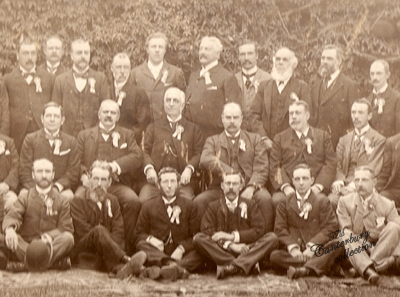
George Collard, centre 1897 with councillors (detail from my photo)
1902-3 "Council of the Borough"
Councillor George Collard, Mayor
Frank Safford Esq., Recorder
Julian Frank Whichcord, Sheriff
Henry Fielding, Under-sheriff
Aldermen: Henry Hart, George Collard, Frederick Kennett (retire Nov 1904), Thomas Cross, William Watson Mason, Thomas Wells (retire Nov. 1907)
Councillors
Dane John Ward: William Wiltshier, Julian Frank Whichcord, Frederick John Godden, Samuel S. Warren, Albert Anderson, Fras. Bennett Goldney
Westgate Ward: Henry James Goulden, Edward George Stead, George Pope, G.J. Bosworth Stone, Robert Wm. Whittaker, R.T. Smith
Northgate Ward: Thomas Bourne, Thomas Burren, William Hearne, William John Russell, Frederick Thos. Gentry, William Rowland Harris
1903 TOWN CRIER - Walter E. Black, 14 Rose Lane
1904
Councillor George Collard, Mayor
Henry Fielding Esq., Town Clerk & Clerk of the Peace
J. Henniker Heaton, Member of Parliament
Dr. T. S. Johnson, Coroner
1913 "Council of the Borough"
George Mount, Esq., Mayor
In 1924 the first housing estate was built on land purchased from Mounts Nurseries at Forty Acres
John George Bosworth Stone, Deputy Mayor
Frank Safford, 2 Pump Court, Temple , London, Recorder
Councillor Albert Shreeves Paine, Sheriff
Henry Fielding, 15 Burgate Street, Under-sheriff
Aldermen: Fras. Bennett-Goldney M.P., William Watson Mason, William Wiltshier (retire Nov 1913), Sir. George Collard, Henry Hart, Frederick Thomas Gentry (retire Nov. 1916)
Councillors
Dane John Ward: Herbert John Belsey, Frederick John Godden, Ramsay Allan Bremner, Edward Vincent Dean, John Gilbert Johnson, Leonard Apsley Philpott
Westgate Ward: George Pope, George J. B. Stone, George Henry Downs, Fortescue West, James Benn, Thomas Wood
Northgate Ward: Henry Andrews, William John Russell, Thomas Burren, Wm. George Dickins, Thomas Bourne, Albert Shreeves Paine
Elective Auditors: Ernest Ge. Wood & Harry J. Houlden
Town Clerk - Henry Fielding
City Surveyor - A. C. Turley
Medical Officer - F. Wacher
Sanitary Inspector - S. Jeffrey
Electrical Engineer - C. A. Blascheck
Police Superintendent - J. H. Dain
City Accountant - T. Wells
Irrigation Manager - C. TERRY
1917-8 "Council of the Borough"
Ramsay Allan Bremner, Esq., Mayor
Henry Fielding Esq., Town Clerk
Fortescue West Esq., Sheriff
J.C.B. Stone Esq., Dept. Mayor
Aldermen: Sir George Collard, Albert W. Anderson, Henry Hart (ret. 1918), Francis Bennett-Gouldney (M.P.), George Pope, William Wiltshier (ret. 1921)
Councillors
Dane John Ward: John G. Johnson, Leonard Apsley Philpott, Herbert J. Belsey, Albert Pentecost, Edward V. Dean, Ramsay Allan Bremner
Westgate Ward: James Benn, Thomas Wood, Robert Henry Arrowsmith, John George Bosworth Stone, Charles Richardson, Fortescue West
Northgate Ward: James McClemens, Albert S. Paine, Vaughan Page, William John Russell, William George Dickins, George Mount
MAYORS
John Lynde, 1448
Thomas Fookys, 1515, 1518
John Naylor, 1516
William Rutland, 1519
William Brigges, 1524
John Brigges, 1525
William Nutte, 1533, 34
Thomas Bele, 1540
Rober Lewes, 1540, 41
William Copyn, 1542
William Copyn, 1553
Mr. Anthony Oughton, 1702
Mr. Anthony Oughton, 1730
Thomas Parker, 1810
William Plummer Esq., 1843, 1847, 1854
Charles Goulden, 1878
George Royle Frend Esq., 1882
Samuel Prentice, Esq., St. George's Place, 1889
Councillor George Collard, 1902/3
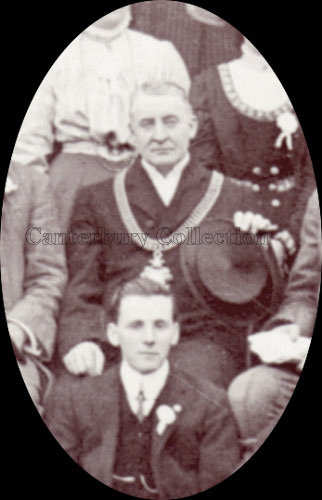
Francis Bennett-Goldney, 1905-1910
George Mount, Esq., 1913
Ramsay Allan Bremner, Esq., 1917/18
Rev. S. Gordon Wilson, 1930 & 1931
Alderman Charles Lefevre, 1942
Alderman Mrs. E.M. Hews, 1948
![]()
"Mr D'anvers communicates a paper published in the Kentish Post or Canterbury News-Letter on the 27th of April last; with some remarks upon it. The paper was addressed to the Freemen of Canterbury, a little before their Election of Representatives, and is as follows:
Gentlemen,
The Oath to be taken by the late Acto of Parliament is the Milstone that will grind you to Pieces, if you do not ward off the Blow; and had Gentlemen considered enough the Consequeces of it, they would never have consented to it.
I speak as a Christian to Christian Electors; and it puts me in Mind of another Bill, carried on by a noble Lord of more Wit than Charity, who said by that Bill he had damn'd one Part of the Nation and starved the other.
It puts an entire Stop to all Acts of Charity; thus had any Candidate been inclined to have paid off your heavy Workhouse Debt, it must have precluded the Votes of a great many Coniciences truly scrupulous; and I question whether the Garments lately given* to the poor, may not be construed Bribery, when it was only designed to cloath the Naked.
As the Case now stands, I advise you to save this City from Judgments consequent on the Guilt of Perjury; for I hear they are determined to swear the Electors. Consider how many poor inconsiderate, drunken People there may be who will take rash Oaths; which you may thus prevent; Let the three** Candidates and their chief Friends meet and agree that no Oath shall be tender'd. Thus you will save the Souls of many People from Perdition, and their families from Ruin. Consider the Fate of Dover, who are now ruining each other with Actions. Should all or any one Candidate refuse to oblige you, let the Refuser lose your Favour, and you will easily find other Gentlemen of Fortunes and Abilities to supply their Places.
I am glad of this Opportunity of Vindicating one of your Candidates from an Aspersion, viz. That (by an Advertisement) he openly avows Bribery and Corruption: No, he openly and honestly declares, he voted against the Bill to prevent Bribery and Corruption. He thought the Reasons were so obvious, the Oath so terrible, there was no need to mention either them, or it; a Resolution becoming a Christian, not perhaps a modern Patriot.
I and my Family have voted for him many Years; and he hath laid a fresh Obligation upon me and all Hop-Planters by his late Diligence in procuring an Act to prevent all clandestine Importations of foreign Hops; and when other Gentlemen were satisfy'd with laying only a Penalty upon every Pound of Hops, he got a Clause to have them burnt. (see p.238) I can go no where in Canterbury, but I see several Objects of his Benevolence; some advanced, others saved from Poverty, and even Death. And I should be sorry to see our City divested of all Help, in Time of need, and so far from the Throne as it must needs be, if this Gentleman should not represent us, but I hope, how corrupt soever we are, we have not lost our Gratitude.
These are my own Thoughts; and if we should agree in Opinion, we should shew ourselves People of Honour and Gratitude, and have the Pleasure of saving a great many Souls, and hiding a Mulitude of Sins.
J.C.
*By Thomas May, Esq. soon after he declared himself a Candidate
**Sir Thomas Hales, Bart., Sir William Hardres, Bart., Thomas May, Esq.
The Gentlemen's Magazine 1734